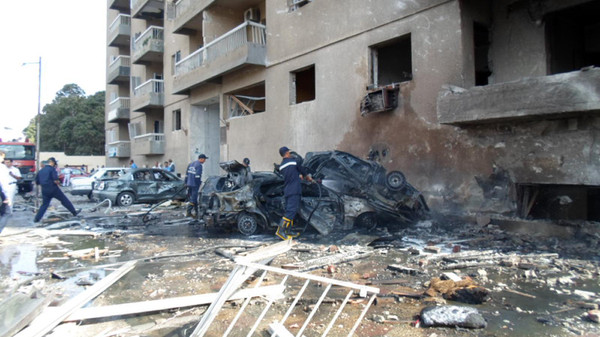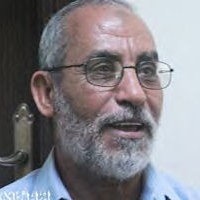![]()
Tue, October 26, 2013 | MEForum | by Jonathan Spyer
First published in The Jerusalem Post.

A destroyed part of the military intelligence compound’s wall and burnt vehicles after a car bomb attack on October 19, 2013 in Egypt’s canal city of Ismailia. (AFP)
A suicide bombing this week at Egyptian Military Intelligence headquarters in the city of Ismailiya has been claimed by Ansar Beit al Maqdis. This organization is a Salafi Jihadi group with links to organizations of a similar kind in the Gaza Strip. Eleven people, including six soldiers were wounded in the bombing.
The Ismailiya attack is the latest episode in a growing Islamist insurgency against the de facto rule of General Abd al Fatah al-Sisi and the military in Egypt. It was of particular significance because the city lies just west of the Suez Canal, outside of the Sinai Peninsula. In the poorly policed area of northern Sinai, jihadi groups have been active since the military coup of July 3, and even before it.
But the Ismailiya bombing represents only the second time that Ansar Beit al Maqdis has managed to strike west of the canal. This attack may well be a sign of things to come.
Yet while the growing violence in Egypt undoubtedly constitutes a security headache for the Egyptian regime, it contains no political threat to General Sisi and those around him.
Salafi terrorists are not going to take power in Egypt. They are an irritant, but the political result of their activities is likely to be growing support for Sisi, and calls for harsher measures mirroring Hosni Mubarak’s crackdown on similar groups in the 1990s.
A crackdown would have wide public support. The ongoing activities of the jihadis, meanwhile, at least as long as they do not exceed a certain volume, provide a useful backdrop to the continued presence of the army at the center of public life in Egypt.
The growing pitch of Islamist violence is an indication of the vanishing options that Sisi has left available to the Islamists.
Since the July 3 coup, he has deliberately sought to exclude the Islamists from political life in every possible way, thus leaving them only the options of effective marginalization or a turn to force.
Shortly after the coup, the Muslim Brotherhood was declared an illegal organization and its assets seized. Leaders of the movement, including incumbent President Mohammed Morsy, were arrested. On August 14th, the army engaged in a bloody crackdown on the movement’s sit-in at the Rabia Mosque in Cairo.
Subsequent months have seen a series of stormy and violent demonstrations by the Brotherhood, demanding the release of their leaders and the dropping of all charges against them, and that the group be permitted to return to political activity.
The latest of these took place on October 6th, the day on which Egyptians mark the ‘victory’ of the 1973 October War. Supporters of the Muslim Brotherhood sought to make their way to Tahrir Square, while protesting the detention of Morsy and calling al-Sisi a ‘murderer.’
The response of the security forces was harsh and uncompromising. Around 50 people were killed in the subsequent clashes. Scores were wounded, 200 members of the Muslim Brotherhood were detained.
Along with the uncompromising response on the streets, the military government has sought to directly link the stormy Brotherhood demonstrations in the cities with the insurgency erupting in Sinai.
Thus, a statement released to the press by Interior Minister General Mohammed Ibrahim after the Ismailiya attacks asserted that “The Muslim Brotherhood has a new source of funding, as is indicated by the attack on Monday morning against South Sinai Security Directorate using a booby-trapped vehicle driven by a suicide bomber.”
By turning to force, Egypt’s Islamists would be ‘playing’ the security forces on the latters’ home turf, with no hope of victory. But political activity is also closed to them.
In current discussions over amending the Egyptian constitution, meanwhile, it appears that an amendment to article 54, which deals with the foundation of political parties, is set to be approved. The amendment will prohibit the creation of political parties on a religious basis, or political activity based on religion.
Even the Salafi al-Nour party, which is largely cooperating with the military controlled government, initially objected to this (though it now appears to have recanted.)
Other Islamist groups are struggling to come up with a response. The Gamaa al-Islamiya movement, a formerly terrorist group which entered politics after the toppling of Mubarak, expressed the Islamists’ dilemma in the clearest way.
Speaking to al-Ahram newspaper, one of its leaders said that after Mubarak’s fall, they had ‘became engaged in the political process. We made some mistakes, of course. Such is the nature of the political game. But now society wants to ban us. How are we supposed to persuade our youth not to engage in politics and not to turn to violence again?”
The answer, from the point of the view of the present Egyptian authorities, is something like ‘that’s your problem.’ General Sisi’s approach may appear unfamiliar to contemporary western observers because he is not seeking to hold the Islamists to a stalemate and then seek an accommodation. Rather, his goal appears to be strategic victory in his battle with the Muslim Brotherhood and the smaller Islamist factions. To this end, he is offering them two alternatives: accept political oblivion — or choose to resist it, and be destroyed by the army.
Jonathan Spyer is a senior research fellow at the Global Research in International Affairs (GLORIA) Center, and a fellow at the Middle East Forum.



 RSS
RSS










The new Shahada in Islam; Ends justify the means. This will be the third one after the two others. Ironically Islam is nothing but plagiarized and adulterated Judaism. This is puzzling to me; The Jews are cousins of the Arabs yet the Jews are smart and the Arabs are stupid.